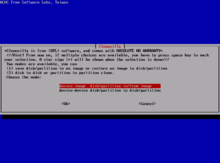Clonezilla
 | |
 the Clonezilla Live CD | |
| Original author(s) | Steven Shiau |
|---|---|
| Developer(s) | NCHC Free Software Labs |
| Stable release | 2.6.6-15[1]
/ 6 May 2020 |
| Preview release | 20200507-groovy[2]
/ May 7, 2020 |
| Repository | |
| Written in | Perl, Unix shell |
| Operating system | POSIX, Linux |
| Available in | English, Spanish, French, Italian, Japanese, Chinese (Simplified), Chinese (Traditional) |
| Type | Disk cloning, Disaster recovery |
| License | GPL |
| Website | clonezilla |
Clonezilla is a free disk cloning, disk imaging, data recovery, and deployment computer program.[3][4] Clonezilla is designed by Steven Shiau and developed by the NCHC Free Software Labs in Taiwan.[5][6][7][8] Clonezilla SE provides multicast support similar to Norton Ghost Corporate Edition.
Clonezilla Live

Clonezilla Live enables a user to clone a single computer's storage media,[9] or a single partition on the media, to a separate medium device. The cloned data can be saved as an image-file or as a duplicated copy of the data. The data can be saved to locally attached storage device, an SSH server, a Samba server, or an NFS file-share. The clone file can then be used to restore the original when needed.
Clonezilla doesn't support online imaging yet, i.e. the partition to be cloned has to be unmounted. Clonezilla application can be run from a USB flash drive or a CD/DVD-ROM. Clonezilla requires no modification to the computer; the software runs in its own booted environment.
Clonezilla Server
Clonezilla Server is used to clone many computers simultaneously across a network. This is done using a Diskless Remote Boot in Linux (DRBL) server and computer workstations that can boot from a network.
See also
References
- ^ Shiau, Steven (2020-05-06). "Stable Clonezilla live 2.6.6-15 Released". Clonezilla's Mailing Lists at SourceForge. Retrieved 2020-05-09.
- ^ Shiau, Steven. "Clonezilla - Downloads". Clonezilla. Retrieved 2020-05-09.
- ^ Windows, Jack Wallen in; Office; March 23, in Microsoft on; 2010; Pst, 5:45 Am. "How do I clone a hard drive with Clonezilla?". TechRepublic. Retrieved 2020-06-24.
{{cite web}}:|last4=has numeric name (help)CS1 maint: numeric names: authors list (link) - ^ July 2017, Nate Drake 14. "How to clone your hard drive with Clonezilla". TechRadar. Retrieved 2020-06-24.
{{cite web}}: CS1 maint: numeric names: authors list (link) - ^ "Interview with Steven Shiau". Retrieved 22 August 2014.
- ^ "Review: Clonezilla system imaging". TechRepublic.
- ^ "Clonezilla: A Drive-Duping Monster With a Fearsome Face". December 28, 2011.
- ^ "Manage partitions and disks with GParted-Clonezilla live CD". July 2, 2007.
- ^ "Clonezilla Live". PCWorld. August 26, 2009.
